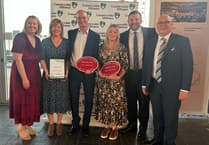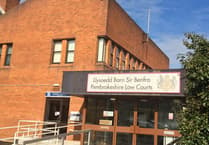Lifetime’s dedication
So many enthusiasts across West Wales have discovered a neglected old tractor, car or motor bike which they have spent weeks and months - sometimes years - passionately with lots of tlc restoring it to it’s original pristine condition.
Cheffins - the UK-based auctioneer - is due to sell near Potters Bar in Hertfordshire tomorrow (Saturday) what it describes as ‘one of the most important collections of classic Ford and Fordson tractors’ on behalf of well-known enthusiast Paul Cable.
Comprising of 38 sought-after classic tractors and piles of implements and spares, the collection is expected to generate in excess of £500,000.
Amassed over 14 years of collecting, many of the tractors on offer are some of the rarest examples of their type to have hit the market -including the uncommon Fordson County derivatives such as the Super-4, Super-6 and a 1957 Four Drive.
Cheffins director Oliver Godfrey tells me: “Paul Cable was - at one time - one of the largest agricultural contractors in Hertfordshire, but he decided to retire from the business in 2003 and devote time to his passion for collecting classic tractors, whilst still farming 150 acres.
Following a 50-year career in farming, he has decided to retire and sell his collection at one of the most significant on-site sales for machinery of this type to have hit the market for many years.
Leading the way will be the County 1474 ‘Long nose’, which has a pre-sale estimate in the region of £60,000-£70,000; swiftly followed by the Doe Triple-D (which has some good provenance with well-known previous owners). It’s also expected to sell in the region of £60,000 -£70,000.
A Ford FW-60 is expected to make between £20,000 and £25,000, whilst a low-houred 1979 County 1174 (which operated at Stansted Airport) also has an estimate of £20,000-£25,000.
Mainly dating back to the 1960s, 1970s and 1980s, all of the tractors on offer have been wonderfully restored and preserved.
Also on offer on the day will be a 1956 Land Rover Series 1, which has been subject to an extensive restoration over a three-year period.
“This is one of the finest collections of Ford and Fordson variants. With a fantastic eye and a skill for preservation, Paul’s collection is a Ford and Fordson enthusiast’s dream. The level of interest we have had for this sale has been exceptional and we are expecting it to be incredibly busy on the day,” added Godfrey.
Community projects
I’m quite sure that all readers of this column believe that the British countryside is our most valuable natural asset and its contribution to our everyday life cannot be underestimated.
Established by HRH The Prince of Wales in 2010, the Prince’s Countryside Fund aims to enhance the prospects of family farm businesses and the quality of rural life.
Claire Saunders, director of the fund, said: “This is a critical time for people and businesses in our rural areas, and we are seeking applicants for our grant programme who can help to ensure that their rural communities can thrive now and in the future. The fund is committed to supporting projects which will reinvigorate and sustain community networks, by providing services and amenities.
“We want to hear from innovative and creative community led projects that are responding to local needs and would urge people to consider applying. Whether this is bringing new life to your village shop and pub, increasing access to rural employment and training, or bringing together farming communities, we would love to hear from you.”
Funding is also available for projects that will improve the prospects of viability for family farm businesses, for example by providing training or education schemes.
The fund’s grant giving helps to support a diverse range of projects, often delivered locally by grassroots organisations and community groups, and since the fund was set-up, it has distributed more than £9 million to communities across the UK.
We believe that the British countryside is our most valuable natural asset and its contribution to our everyday life should not be underestimated.
Applications opened on April 30 for community groups and charities to apply for grant funding of up to £50,000 from The Prince’s Countryside Fund, until June 14, 2018.
The fund is particularly keen to receive applications from Northern Ireland, Scotland, and Wales - contact Helen Aldis on 020 7566 6659.
Promotions
After making a recent comment in this column, regarding the buying powers enjoyed by the supermarkets, the Co-op recently reminded me that they have always supported the UK farming industry and promoted British food.
“Recently, you, our customers and members, have shown a big interest in where your food comes from, and we know how important animal welfare, the environment and fairness in the supply chain are to you.
“We’ve taken this on board, and have created long-term relationships with our farmers and suppliers so that we can give you complete transparency in our supply chain, which is built on honesty, fairness and trust.
“We have established Farming Groups, which, combined with a clear sourcing strategy, gives us a great future. These groups aim to encourage best practice and profitable returns amongst our farmers, and provide you, our customers, with high-quality fresh British meat, poultry and milk.
“We also make sure that our strict animal welfare policies can be upheld both now and into the future.
“We continue to invest in research and development initiatives to help farmers work as efficiently as possible, share best practice with each other and develop our animal welfare standards.
“At the heart of our values is a commitment to champion British farming, to be open and honest about where our food comes from, and to ensure that it is promoted in a fair and transparent way.
“Our agricultural team works with farmers and suppliers to ensure our products are sourced responsibly.
“Our support of British farming goes further than just rolling out the bunting. Over recent years, we have attended the many of the major shows, including the Royal Welsh, where our stands are a huge success.
“On these occasions, we are able to graphically show how much hard work and dedication our producers put in to give the very best quality British food.”
Email from Pittsburg
I was in the UK again at Easter, mostly visiting some small towns, but here’s some of what I learned:
Almost everyone is very polite.
The food is generally outstanding.
There are no guns.
There are too many narrow stairs.
Everything is just a little bit different.
The pubs close too early.
Pubs are not bars, they are community living rooms.
The reason they drive on the left is because all their cars are built backwards.
You’d better like peas, potatoes and sausage.
They eat with their forks upside down.
People don’t seem to be afraid of their neighbours or the government.
(contributed).
Bereavement
It is love that makes death so awful - it is the fact that you truly love someone that means you grieve when they have left life behind and left you behind.
But, by the same token, it is love that makes death bearable, because genuine love is not diminished by any circumstances and continues after death.
Christians believe that it is the love of Jesus that holds these two opposites together. If you are reading this because you are recently bereaved, these words are written in the sincere hope that you will find them sensitive and sympathetic.
Jesus was himself a mourner following the death of his close friend - a man called Lazarus. Like any one of us, he wept - but it is also through Jesus that Christians hold the hope that death is not the end.
Grieving people often go through phases of shock and denial, isolation, anger, bargaining, depression, acceptance and hope.
Everyone goes through this process at a different pace, sometimes seeming to make not progress at all.
Christians suggest that this is a God-given cycle which enables people to be fully human in the way they respond to death - there are no short cuts, even for people with a profound belief in heaven.
The Christian hope is that faith in God can help people to free themselves from being permanently in slavery to the loss they have suffered. It allows people to readjust to the world without the person who has died in it, and to create a context in which new friendships can form.
Grieving people very often seek conversations with Christian leaders or friends. Meeting someone with faith can unlock permission to talk about spiritual concerns. They might include doubt, anger with God, or a search for assurance about what lies beyond death. All these are good things to talk about, however, bereaved people are extremely vulnerable.




